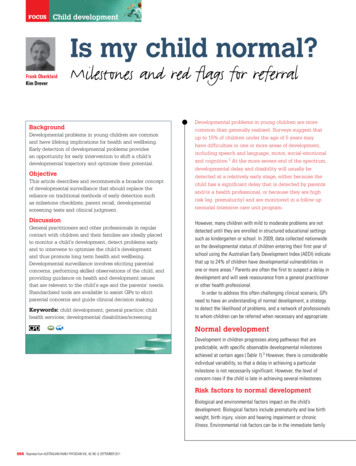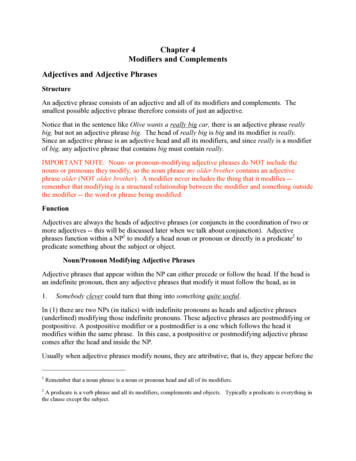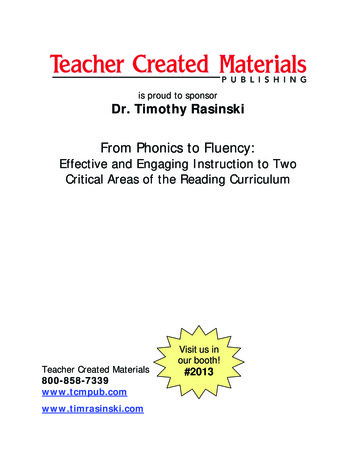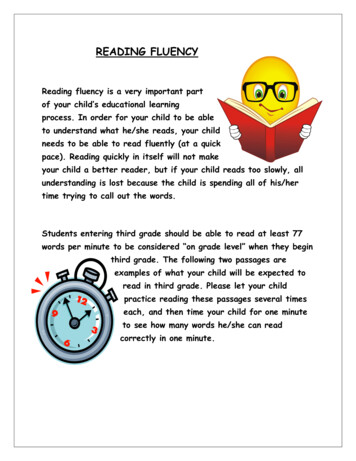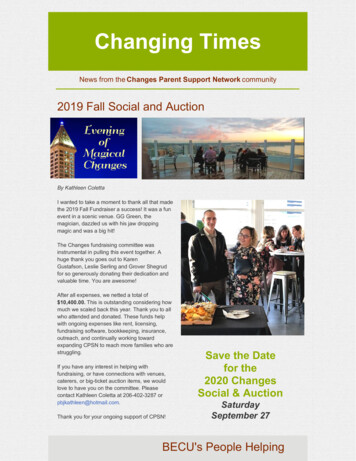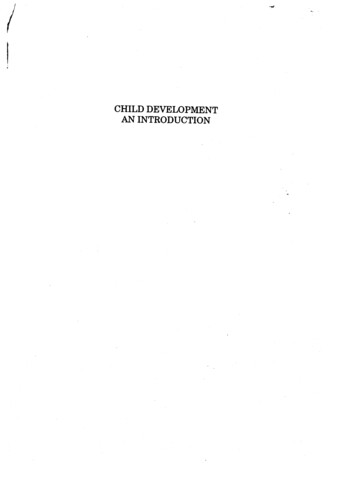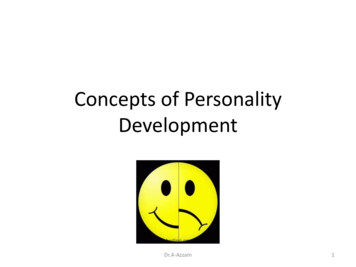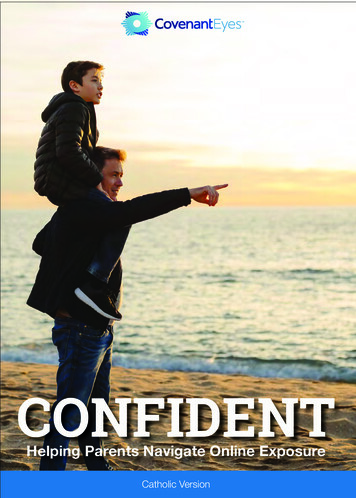
Transcription
HelpingYour ChildBecome aResponsible Citizen
U.S. Department of EducationMargaret SpellingsSecretaryFirst published in June 1993 under a differenttitle. Revised in 2003, 2004 and 2005.This booklet is in the public domain.Authorization to reproduce it in whole orin part for educational purposes is granted.While permission to reprint this publicationis not necessary, the citation should be:U.S. Department of EducationOffice of Communications andOutreachHelping Your Child Become a Responsible CitizenWashington, D.C., 2005.To order copies of this publication in Englishor Spanish write to:ED PubsEducation Publications CenterU.S. Department of EducationP.O. Box 1398Jessup, MD 20794-1398;or fax your request to: (301) 470-1244;or e-mail your request to: edpubs@inet.ed.gov.or call in your request toll-free: 1-877-433-7827(1-877-4-ED-PUBS). If 877 is not yet available inyour area, call 1-800-872-5327 (1-800-USA-LEARN).Those who use a telecommunications device for thedeaf (TDD) or a teletypewriter (TTY), should call1-800-437-0833.or order online at:www.ed.gov/pubs/edpubs.html.HelpingYour ChildBecome a Responsible CitizenWith activities for elementary, middle and high school-aged childrenThis publication is also available on theDepartment’s website at:www.ed.gov/parents/academic/help/hyc.html.On request, this publication is available inalternate formats, such as Braille, large print,audiotape, or computer diskette. For moreinformation, please contact the Department’sAlternate Format Center at (202) 260-9895 or(202) 205-0818.Children’s books and magazines are mentioned inthis booklet as examples and are only a few ofmany appropriate children’s books and periodicals.Other materials mentioned are provided asresources and examples for the reader’sconvenience. Listing of materials and resources inthis book should not be construed or interpreted asan endorsement by the Department of any privateorganization or business listed herein.U.S. Department of EducationOffice of Communications and OutreachOffice of Safe and Drug-Free Schools
ForewordContents“Intelligence is not enough. Intelligence plus character,that is the goal of true education.”Introduction .v— Martin Luther King Jr.As parents, we all want our children to grow up to be responsible citizens andgood people. We want them to learn to feel, think and act with respect forthemselves and for other people. We want them to pursue their own well-being,while also being considerate of the needs and feelings of others. We want themto recognize and honor the democratic principles upon which our country wasfounded. We want them, in short, to develop strong character.The cornerstone of the No Child Left Behind Act of 2001 is academic achievementand professional success built upon a foundation of moral strength and civic virtue.As Secretary of Education Margaret Spellings has said, “A quality educationprovides citizens with the tools to participate fully in their society.” And the payoffs for encouraging our children’s character development are enormous. Researchhas shown that children who grow up with strong, positive values are happierand do better in school. They are also better able to balance their personal wantsand needs against those of others and to make positive contributions to society.On the other hand, if children do not learn proper values and behavior whenthey are very young, problems can develop. These problems can mushroom withserious consequences as children grow older—dropping out of school, drug use,teenage pregnancy, violent crime—the list goes on.What Does “Strong Character” Mean? .1Compassion .1Honesty and Fairness.3Self-discipline.5Good Judgement.7Respect for Others .9Self-respect .11Courage .13Responsibility.15Citizenship and Patriotism.16How Can We Help Children Learn about Character? .18Set a Good Example .18Set High Standards and Clear Expectations.20Coach.21Use Literature.22Activities .25Getting to Know Others—from Near and Far .26Gifts from the Heart.27Telling the Truth.28Think about It .30Keep Trying.31Making Decisions.32Magic Words, Caring Deeds .33There’s a Monster in My Room!.34OOPS!.36Stand Up for Yourself .36Helping Out .38More Than Chores.40Our Heroes! .41How Can I Be of Service? .42Coping.43Are You My Friend? .45Listen to Your Feelings .46Share a Story.46Dealing with Media Pressures .49Working with Teachers and Schools to Build Character .51The most important thing we can do for our children is to help them acquirevalues and skills that they can rely on throughout their lives. In doing so, theywill have the best chance to lead good lives as individuals and as citizens of theircommunities and of America.Resources.53Books That Can Support Character Development.53Children’s Magazines.70Booklists .71Bibliography .73Acknowledgments.75iiHelping Your Child Become a Responsible CitizenHelping Your Child Become a Responsible Citizeniii
IntroductionJust as children must be taught to tie their shoes, read and write, solvemath problems, and understand science concepts and events in history, somust they be guided in developing the qualities of character that arevalued by their families and by the communities in which they live. It isonly through guidance and modeling by caring adults that children learnto be honest and thoughtful, to stand up for their principles, to care aboutothers, to act responsibly and to make sound moral choices.Our Founding Fathers understood that our countrywould survive and flourish if our nation was committedto good character and an unyielding dedication to libertyand justice for all. Throughout our history, our mosthonorable heroes practiced the values of hard work andhonesty, commitment to excellence and courage, andself-discipline and perseverance. Today, as we work topreserve peace and freedom throughout the world, weare guided by a national character that respects humandignity and values every life.This booklet provides information about the values and skills that makeup character and good citizenship and what you can do to help yourchild develop strong character. It suggests activities that you and yourschool-aged children can do to put those values to work in your daily livesand tips for working with teachers and schools to ensure that you acttogether to promote the basic values that you want your child to learnand use. Finally, the booklet provides an extensive list of books and otherresources with character-related themes that you can read and discusswith your child to encourage character and citizenship development.Be assured that the qualities of character discussed in this booklet areuniversally recognized by people of many religions and cultures, and theinformation contained in the booklet can be used by parents from manydifferent backgrounds and with different beliefs.— President George W. BushivHelping Your Child Become a Responsible CitizenHelping Your Child Become a Responsible Citizenv
What Does “Strong Character” Mean?Character is a set of qualities, or values, that shape our thoughts, actions,reactions and feelings. People with strong character show compassion, are honest and fair, display self-discipline in setting and meeting goals, make good judgments, show respect to others, show courage in standing up for beliefs, have a strong sense of responsibility, are good citizens who are concerned fortheir community, and maintain self-respect.Babies may begin to cry when they hear other sounds of crying, and cooand laugh when they hear others making happy sounds. By the age ofthree, many children will make an effort to hug or comfort another childor a parent who seems upset. As children grow, compassion can guidetheir actions and behaviors in positive ways. They understand that bydoing something wrong, they cause others pain or unhappiness.We can promote compassion by helping our children to think about howothers feel. For example, if your child says or does something hurtful toanother child, help him* to focus his attention on the feelings of his victimby saying, for example, “How do you think Zack feels? Would you like tofeel like that?” Children develop compassion by practicing acts of caringand kindness towards others. As adults, we need to emphasize theimportance of helping others, giving others the benefit of the doubt andbeing open to differences.What You Can DoCompassionCompassion, or empathy, means identifyingwith and being concerned about otherpeople’s feelings and needs. It provides the emotional root for caringabout other people. It allows us to be understanding and tolerant ofdifferent points of views and beliefs, it makes us aware of the suffering ofothers, and it allows us to empathize with them or to feel their sufferingas our own. Compassion also allows us to feel joy and excitement—ratherthan anger and despair—at other people’s successes and achievements. Talk about the point of view of others as you watch TV, read booksor discuss other people with your child. For example, ask, “What doyou think that character is feeling and thinking?” Show care toward others, such as doing errands for sick neighbors oropening doors for others. Give others the benefit of the doubt. If your child complains that aclassmate deliberately pushed her down on the way to lunch, explainthat sometimes when people are in a hurry, they don’t watch wherethey’re going—they don’t mean to push or hurt anyone.* Please note: In this booklet, we refer to a child as “him” in some places and “her” in others. We do this to make the bookleteasier to read. Please understand, however, that every point that we make is the same for boys and girls.1Helping Your Child Become a Responsible CitizenHelping Your Child Become a Responsible Citizen2
Be open to differences. If your child says “Our new neighbors dressfunny,” explain that people often wear clothes that reflect theircultures or native countries.—Daddy, why is Grandma crying?—She’s very sad. One of her friends just died. Come sit with me.Do you remember how you felt when your gerbil, Whiskers,died?—I felt sad and lonely.—Well imagine how much worse Grandma must feel losing afriend. Maybe you can think of a way to help her.—I could give her a hug. . .—That’s a great idea!Honesty and FairnessSimply put, honesty means being truthful with ourselves and with others.It means caring enough about others not to mislead them for personalbenefit. It means facing up to our mistakes, even when we have to admitthem to others or when they may get us into trouble.Fairness means acting in a just way and making decisions, especiallyimportant ones, on the basis of evidence rather than prejudice. It means“playing by the rules” and standing up for the right of everyone to betreated equally and honestly.3Helping Your Child Become a Responsible CitizenTo understand the importance of being honest and fair, children need tolearn that living together in a family, community or even a nationdepends on mutual trust. Without honesty and fairness, trusting eachother becomes very difficult, and families—and societies—fall apart.Words of caution: There is abig difference between beingdishonest—lying or cheating—and “making things up,” aschildren often do in fantasyplay. If children are taughtthat not telling the truth is “abad thing,” some youngchildren might assume that itis also a bad thing to pretendto be a princess or an astronaut. Although you should discourage yourchild from deliberately lying and cheating, you should also let him knowthat it is fine to role play and pretend.What You Can Do Be a model of honest relations with others. Discuss with your child what honesty is and is not. Point out, forexample, that being honest doesn’t mean telling someone you thinkhe looks ugly. Kindness goes along with honesty.—Dad, Why can’t I choose what video to watch? It isnot fair that Ramon gets to pick!—Yes, it is fair, because you got to pick the video wewatched last night. Now it is Ramon’s turn.Helping Your Child Become a Responsible Citizen4
Discuss fairness (chances are that your child will bring it up) indifferent situations. For example, how do we show fairness in ourfamily? What does fairness mean to the community? What werestandards of fairness in the past? Talk about how you try to be fair in your life and work. What issuesof justice have you wrestled with? Your adolescent will be particularly interested in talking with you about these things.—Mom, why did you tell the cashier that she’dgiven you too much change? It was hermistake, so why didn’t you just keep it?—Because the money wasn’t mine, and it wouldhave been dishonest for me to keep it.Learning self-discipline helps children regulate their behavior and givesthem the willpower to make good decisions and choices. On the otherhand, the failure to develop self-discipline leaves children wide open todestructive behavior. Without the ability to control or evaluate theirimpulses, they often dive headlong into harmful situations.What You Can Do Talk with your child about setting reachable goals. For example, helphim break big tasks into little tasks that can be accomplished one at atime. Have the child pick a task and set a deadline for completing it.When the deadline has passed, check together to see if the task wascompleted. Help your child build a sense of her competence. To do this, sheneeds experiences of success, no matter how small. This buildsconfidence and effort for the next time. Keep making the tasks just alittle more challenging but doable.Self-disciplineSelf-discipline is the ability to set a realistic goal or make a plan—then stickwith it. It is the ability to resist doing things that can hurt others orourselves. It involves keeping promises and following through oncommitments. It is the foundation of many other qualities of character.Often self-discipline requires persistence and sticking to long-termcommitments—putting off immediate pleasure for later fulfillment.It alsoincludes dealing effectively with emotions, such as anger and envy, anddeveloping patience.5Helping Your Child Become a Responsible Citizen—Who just called?—It was Tyler, Dad. He wanted me to gowith him to the video store to check outthe new DVDs.—What did you tell him?—I said I couldn’t, because you and I need towork on my science project for school.Helping Your Child Become a Responsible Citizen6
What You Can DoGood JudgmentChildren develop strongcharacter by learning to thinkabout and make soundjudgments about what isright or wrong, good or bad.These are not always easydistinctions for adults tomake, much less children.For example, it can be difficult for a child to recognize the differencebetween acting bravely and acting recklessly. As parents, we can help byshowing, through what we do as well as what we say, that it is importantin such situations to think carefully and honestly about what should bedone, carefully weighing how others will be affected by what we do.Sometimes we get into trouble because we “just didn’t think.” We let ouremotions lead us to actions that we regret later. Making good judgmentsrequires skills in monitoring impulses, using reasoning to sort throughfeelings and facts, and thinking about the consequences of our actions.Your child’s ability to think and make sound judgments will improve asshe matures. With age, however, it also may become easier for her to try tojustify and make excuses for selfish or reckless behavior. However, if youhave helped her develop strong habits of honesty, courage, responsibilityand self-respect, your child will have the ability to see the flaws in herreasoning and be able to come to the right conclusion about what to do.7Helping Your Child Become a Responsible Citizen Teach your child to stop and think before acting on impulse. Teach your child to tell fact from feeling. Let him know that justbecause he feels strongly about something—such as hitting someonewho made him angry— doesn’t mean it’sthe right thing to do. Encourage your child to think about theconsequences of her decisions. Tell herlittle stories about situations she mightface and talk about actions she might take,who might be affected by her actions,what might happen because of her actionsand what the best action might be. When your child has a problem with arule, brainstorm together a list of possiblereasons for the rule. This leads to greaterunderstanding. Remind your child to pay attention to the rules or codes that applyin each situation. For example, the rules for behaving in church aredifferent from those for a football game.—I got really mad because John wouldn’t talk to me.—What were you doing at the time?—We were in line for lunch.—Well, what’s the rule about waiting in line?—You aren’t supposed to talk.—Then John was doing the right thing, wasn’t he?Helping Your Child Become a Responsible Citizen8
Respect for OthersRespect for others is based on self-respect and is summed up in the GoldenRule: Do unto others as you would have others do unto you. It is thevalue that makes the world a more decent and civilized place.What You Can Do Practice respectful ways of communicating. Show your child how totalk to others with respect. Help your child to resolve conflicts nonviolently. When facing aconflict, encourage your child to do the following: (1) Find out whatthe conflict is. For example, if your child is angry because his littlebrother barges into his room without knocking, help him to explainthe conflict by using an “I” statement, such as “I feel angry whenyou come into my room without knocking.” (2) Next, suggestdifferent ways he might resolve the conflict. He could say to hisbrother, “I know I can’t always hear when I’m listening to music, soyou knock really loud five times—if I don’t answer, then open thedoor.” Or, “If I don’t answer your knock, slide a note under thedoor.” Or, “Let’s use our walkie talkies.” (3) Then have your childagree on one of the choices. (4) Finally, have him make a plan tocheck whether the solution is working. Teach your child to respect the valued traditions of your heritage.Talk about family customs for showing respect, for honoring eldersand for helping the community. Encourage her to do these things.People show respect in many ways. They speak and act civilly—avoidinginsults, cruel remarks and rude or crude language. They are courteousand considerate of others, including family members and friends, and careabout their rights, beliefs and well-being. They treat others fairly and asindividuals, regardless of race, sex, age or ethnic group. They displaytolerance for people who do not share their personal beliefs and likes—solong as those people do not harm others.Research indicates that children learn to respect others when they aretreated with respect themselves. Constant criticism of a child, negativecomments about him and failure to praisehis achievements can lead the child to bedisrespectful to others. Treating childrenwith respect pays large dividends bothto families and to societies as a whole.—Kaylee, is that my new sweater you’re wearing.—Yeah, Mom. What’s wrong? Doesn’t it look OK withthis skirt?—How it looks on you isn’t the point. You didn’t askme if you could borrow that sweater, did you?—No, Mom. I guess I thought you wouldn’t mind.—Well, I do mind that you didn’t ask first. That’s notvery respectful, is it?9Helping Your Child Become a Responsible CitizenHelping Your Child Become a Responsible Citizen10
What You Can DoSelf-respectSelf-respect means taking satisfaction in appropriate behavior and hardwon accomplishments. People with self-respect also respect others. Theydo not need to disparage others or build themselves up by bragging orexaggerating their abilities or talents. They do not need lots of money orpower to feel good about themselves.People who respect themselvesview selfishness, loss of selfdiscipline, recklessness,cowardice and dishonesty aswrong and unworthy of them.They have inner strength and areunwilling to let others use ormanipulate them. They knowthat showing patience ortolerance does not meanallowing others to mistreat them.People with self-respect do not crumble when they fail. They acceptmistakes as a part of life. As we help our children set high standards forthemselves, we also need to let them know that failure is noembarrassment when they have done their best. Encourage your child to build a positive identity that focuses on herintegrity and talents. Emphasize that character is built upon the decisions and actions aperson takes each day. Work with your child to help him reach his full potential byencouraging him to develop his talents, set reachable goals andhonor himself as a unique person. Teach your child how to choose good values. Help her reason aboutwhat are worthy goals and what are proper means to reach thosegoals.—Why so down, Charlie?—We lost the game.—Did you play a good game?—Yeah, we played our hardest.—There’s no shame in losing a game when you’veplayed your best and the other team just playedbetter. Hold your head high, son!Teaching children self-respect, however, does not mean complimentingeverything they do. They also need honest criticism from time to time.When we do criticize, we should focus on things they have done, not onthem personally.11Helping Your Child Become a Responsible CitizenHelping Your Child Become a Responsib
Talk about the point of view of others as you watch TV, read books or discuss other people with your child. For example, ask, “What do you think that character is feeling and thinking?” Show care toward others, such as doing errands for sick neighbors or opening doors for others.

